Why Do We Love? Why Do We Need It Want It, and Seem to Thrive When In It?
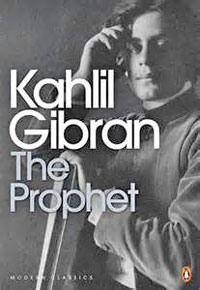 There’s a saying, and it goes something to the effect of “ultimately all we have is love.” Or as Kahlil Gibran put it, “Love gives naught but itself and takes naught but from itself. Love possesses not, nor would it be possessed; for love is sufficient unto love.”
There’s a saying, and it goes something to the effect of “ultimately all we have is love.” Or as Kahlil Gibran put it, “Love gives naught but itself and takes naught but from itself. Love possesses not, nor would it be possessed; for love is sufficient unto love.”
Love, which is an experience at the root of human bonding, is so vital to human beings that without it, we don’t develop properly. We remain impoverished. A loving bond between a human infant and a human caregiver not only creates the potential for development, it contributes to it and is necessary for healthy development to occur.
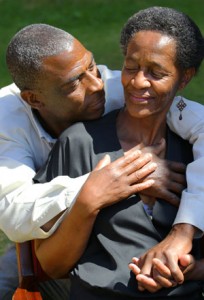 Intimate adult relationships are a great source of love and nurturance. And sexual intimacy with a loving partner fosters connection and bonding. Spiritual experiences even, of oneness and of unity, can be experienced during loving sexual intercourse.
Intimate adult relationships are a great source of love and nurturance. And sexual intimacy with a loving partner fosters connection and bonding. Spiritual experiences even, of oneness and of unity, can be experienced during loving sexual intercourse.
In addition, an important fact specific to human beings is that we are one of the only mammals that practice sex throughout the female’s entire monthly cycle, not just during ovulation. Why? Research is showing that sexual behavior stimulates all sorts of bonding hormones to be released – the “feel good” hormones such as oxytocin and vasopressin and the positive-feeling neurotransmitter dopamine, as well as testosterone and nor-epinephrine. These chemicals are released in even greater amounts during orgasm, all of which nurtures our emotional, psychological, and physical selves. We are fed, fueled, and rejuvenated, if you will, through all forms of contact that engender bonding and intimacy. We are literally designed for it.
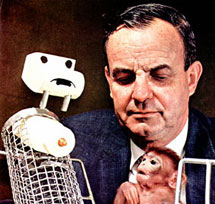 HARRY HARLOW AND RHESUS MONKEYS
HARRY HARLOW AND RHESUS MONKEYS
Studies of maternal deprivation in Rhesus monkeys conducted by psychologist Harry Harlow in the 1950s were monumental studies not only in the study of primates, but in the study of mammalian attachment and loss. Harlow aligned his experimental subjects to human children and media of his day treated his findings as major observations about love and psychological/emotional development in human beings. These “monkey love” research experiments were powerful studies for any and all separations of mothers and infants, including adoption, as well as childrearing in general.
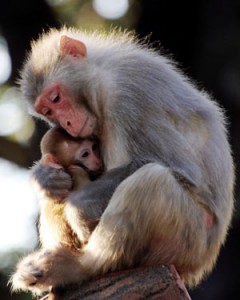 In his University of Wisconsin lab, Harlow examined the nature of love, aiming to illuminate its first cause-and-effect mechanisms based on the relationships formed between infants and mothers. First, he showed that mother love was emotional rather than physiological, supporting the adoption-friendly, widely-accepted theory that continuity of care — “nurture” — was a far more important factor in healthy psychological development than physiological “nature.” Next, he showed that the capacity for attachment was closely related to critical periods in early life, after which it was difficult to impossible to compensate for the loss of early emotional security.
In his University of Wisconsin lab, Harlow examined the nature of love, aiming to illuminate its first cause-and-effect mechanisms based on the relationships formed between infants and mothers. First, he showed that mother love was emotional rather than physiological, supporting the adoption-friendly, widely-accepted theory that continuity of care — “nurture” — was a far more important factor in healthy psychological development than physiological “nature.” Next, he showed that the capacity for attachment was closely related to critical periods in early life, after which it was difficult to impossible to compensate for the loss of early emotional security.
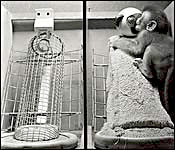 THE STUDY ITSELF
THE STUDY ITSELF
How did Harlow study love and attachment? He separated infant monkeys from their mothers a few hours after birth, then arranged for the young mammals to be “raised” by two kinds of surrogate monkey-mother machines, both equipped to dispense milk. One mother was made out of bare wire. The other was a wire mother covered with soft terry cloth fabric.
Harlow’s first observation was that monkeys who had a choice of mothers spent far more time clinging to the terry-cloth option, even though their physical nourishment also came from bottles mounted on the bare wire mothers. This behaviour informs us that infant bonding was not simply about the satisfaction of physiological needs. Attachment – a sense of safety, a sense of comfort – was not primarily about hunger or thirst. Harlow could not find that is was simply about nursing.
 CRYING OUT…
CRYING OUT…
Harlow even showed that when young monkeys were isolated from contact and touch during infancy, they failed to manifest social contact and bonding later on. The behaviorists were simply incorrect to have originally thought that a child only cries or wails when it’s hungry, thirsty, hot or cold. We have since learned that the cry or wail of distress can mean, just as importantly, that the child needs contact, touch, bonding, comforting — love. These needs are as essential to development as is food. These needs are as essential to adult humans too. Take, for instance, a healthy developmental response to sadness or grief, which might include the desire to be held and comforted by another.
ATTUNEMENT
What makes a loving connection successful is something called “attunement,” which is a receptive, aware-of-other’s-needs energy that extends toward one another. It’s an energy that flows inward as openness and receptivity and outwardly as flexibility, presence, and an attuned, relevant and appropriate response.
 Attunement of this nature can show up as stillness, as alertness, as presence, and as a readiness for appropriate action. This kind of vital, receptive energy is now under-developed in our busy modern world, which is more geared toward endless preoccupation with expansion and acquisition.
Attunement of this nature can show up as stillness, as alertness, as presence, and as a readiness for appropriate action. This kind of vital, receptive energy is now under-developed in our busy modern world, which is more geared toward endless preoccupation with expansion and acquisition.
RECEPTIVE ENERGY
Receptive energy is the form of vital energy manifested as open-hearted grounded presence, and that which allows us to witness others and ourselves with empathy, understanding, and acceptance. Once present and at one with these basic sentiments, we can receive and then integrate in to our awareness that for which we are grateful, appreciative, and available.
Receptive energy also manifests as we move up the levels of personal development. This occurs through self-observation practice (which is based on developing states of grounded presence and open-heartedness) and through working with our Enneagram type structure’s mechanisms, avoidances, and gifts. When fully developed, the receptive energy within us becomes the great emulsifier that allows our essential, higher qualities to be integrated into our operative, driving personality. When combined with understanding that comes from working deeply on type-based themes, we can reach true intrapersonal fulfillment.
When we live these understandings and practices each day, as best we can, we assure lasting and flourishing love. It starts with ourselves first, which enables us to experience lasting and flourishing love with others thereafter.
So after all that, and based on all of my understandings and learnings across many, many years, here is my working definition of love:
[box]“Love is manifested through the development of receptive, grounded presence interwoven with non-judgmental acceptance and unconditional open-heartedness. This basic stance does not imply concurring, condoning, or capitulating to one’s own unhealthy or other’s unhealthy behaviours.
Love involves a commitment to further the well-being and growth of self and other in all domains – physical, emotional, cognitive, and spiritual. Love is fueled by gentle receptivity, sensuousness, and the exploratory instinct of unrestricted, genuine curiosity that is designed to deeply know and experience the heart and being of self and of another.”[/box]
JOIN THE CONVERSATION.
I would love to hear from you, my blog readers, friends and colleagues.
What is your definition of LOVE? It’s a word we so quickly assume we understand, but when I set out to define it, I had an incredibly interesting conversation with myself.
Share your insights, knowledge and inner knowing, would love to hear from you!
To learn more about fostering fulfilling and loving relationships through the Enneagram and between different personality types, check out Dr. David Daniel’s book The Enneagram, Relationships and Intimacy: Understanding one Another Leads to Loving Better and Living More Fully, co-written with Suzanne Dion, and The Enneagram Types Relationship Matrix.
12 Archived Responses to “Why Do We Love?”
Anonymous says:
February 15, 2016 at 12:11 pm
David,
I hope this finds you in peaceful mind and well-being!
I have just come across your blog on Love and thought I would share! Some years ago, I was looking at the word Love and saw an acronym! L.O.V.E. = Living Our Vibrational Essence. When we experience love, we are connecting to the very essence of who we are! Whether the experience comes through a connection from something or someone outside of our selves or from an experience that we have with Life, Love is the remembrance of who we are!
Take good care, Laurie Helgeson
David Daniels, MD says:
February 15, 2016 at 12:15 pm
Yes love is a lot about vibrational energy between people. Thank you. David
David Daniels, MD says:
February 28, 2016 at 4:49 pm
Hi again, I want to add that Type 5s really need to release from contracting away. Do your best just to stay present and hear others as they are, which doesn’t mean agreement. Share your own thoughts as best you can. And see my responses to other Type 5 questions. Warmest Regards, David
Janet Caffin says:
October 17, 2015 at 4:52 pm
Love is the emotion that allows us to attend to another completely, to “stand in the shoes” of the other.
David Daniels, MD says:
June 10, 2016 at 2:08 pm
Hi Janet, and I would just add that love of self allows bus to “stand in our own shoes”. Love is both and meaning deeply both for self and other. warm regards, David
Anonymous says:
March 31, 2015 at 3:57 pm
I recently wrote a play titled, “Love Is All There Is”. It had 4 acts:
The Beginning of Love
The Midcourse of Love
The End of Love
The Rebirth of Love
Put it together after reading 1500 love poems & writing a few poems myself. Great audience response….
David Daniels, MD says:
April 25, 2015 at 10:51 am
Well send in your favorite poem you wrote when you get a chance.
Anonymous says:
March 5, 2015 at 6:00 pm
Thanks David! What rings true for me is that love “starts with ourselves”. It was when I learned to love myself and have empathy for myself that I began to understand Love and how to be accepting and non-judgmental of others. I agree that gratitude is necessary to maintain a loving spirit and to be accepting of what is. It helps bring us back to the present when we can be greatful. Certainly it has been my experience that gratitude helps me be more loving to myself and more likely to be receptive to loving others. Perhaps because it helps to calm the chaos and center me, so I can be giving rather than wanting.
David Daniels, MD says:
March 5, 2015 at 11:10 am
I love what you said. “LOVE is a basic need and desire, for which there is no substitute. Thanks so for your response. Warm regards, David
Anonymous says:
March 4, 2015 at 12:25 pm
Dear David,
Your insightful, wise comments certainly resonate with me. Also I have, and am, experiencing parallel life events. A bit over a year ago, I also had open heart surgery. Mine was an aortal valve replacement, an aneurism repair and repair of a congenital heart defect. No one can understand how I never had symptoms. So every day is a gift, though my body speaks to me louder and more frequently than ever before. You probably already know that my graduate field of study was child development, so I was steeped in Harry Harlow’s work many years ago. One of my favorite books is A General Theory of Love, which I periodically re-read. I have two adopted sons. My youngest, Sean, is a recovering addict. I have learned things about Sean’s infancy that I should have been told when I adopted him at 4 months. To me it explains much about his predisposition to addiction. I intuitively knew something was wrong, but was dismissed as an “over anxious mother” by everyone from whom I sought help. I could add a chapter on love and early infancy from my own experience with two adopted babies. Our life’s journey moves from dependency to strength to inter-dependency and back again to dependency. LOVE is the basic need and desire, for which there is no substitute.
David Daniels, MD says:
March 5, 2015 at 11:11 am
And I just LOVE what you said. Thank you. David
David Daniels, MD says:
June 12, 2016 at 10:18 am
Thank you for this thoughtful comment. Addiction is the result of loss of connection, bonding, love. In most instances addiction is not a disease. We need to have bonding, love, and a sense of self and hope for a positive future. I also have great regard for the book, “A General Theory of Love.” Warm regards, David


